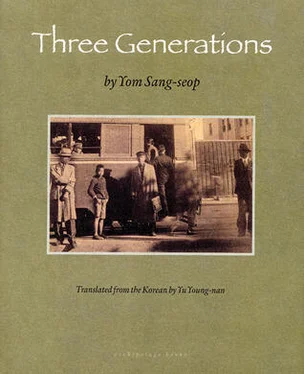Despite her concern, she had no desire to take control of the store. Though it was she who had been most enthusiastic and who wanted to hurry things along, she didn’t have the courage to jump into it. It had all begun when they had the idea of opening a small cosmetics store or a general store, or maybe a fabric shop near a girls’ school carrying mainly yarns and laces. She approached Sang-hun for capital, and he was for the idea, indicating he’d supply the money if Gyeong-ae were to manage the store. He half consented, believing that he would be able to get his hands on several thousand won if his father died, though the plan would fall through if the old man didn’t pass away soon.
When they were heatedly debating what sort of establishment to open, the proprietor of Bacchus asked, in passing, if they’d be interested in buying a tidy grocery store, one that was run by a Japanese acquaintance of hers, who was thinking of selling it out of anger after her husband had gone bankrupt from gambling. The decision was made quickly. The asking price was two thousand won for the building, three hundred for the telephone, and five hundred for the inventory, but in the end they agreed to rent the house for forty won, buy the inventory for four hundred, and lease the phone. They were far from being at a disadvantage, as the seller was eager to rid herself of the store. Both parties wanted to act as quickly as possible. The grocery was located in a quarter that was rapidly turning into a Japanese residential area. Byeong-hwa put down four hundred right away, but for the rest, Sang-hun had to get hold of his father’s money. Now that the old man had finally succumbed, it seemed that they would be able to buy the building after all.
Byeong-hwa’s four hundred had come from Pi-hyeok, but the store and the payment were in Gyeong-ae’s name. Byeong-hwa should have been ashamed to open a grocery with Pi-hyeok’s money if he possessed even a modicum of conscience. Pi-hyeok hadn’t come such a long way and put himself at such risk to let a stranger become a businessman, lead a comfortable life, and get fat.
It had been a mistake on Pi-hyeok’s part to give him the money through Gyeong-ae. If anyone else had been chosen to watch over Byeong-hwa, he would have been beaten to a pulp by now, and news of the betrayal would have spread far and wide. Byeong-hwa would be either in a hospital or at the police station, and the Sanhaejin Grocery’s signboard would have been pulled down.
Actually, the signboard had not yet been put up. None of Byeong-hwa’s comrades knew that he had opened a Japanese grocery store, nor would they be able to fathom how he had managed to do it. Byeong-hwa had firmly made up his mind to turn his back on all of his comrades, and if they ever came to see him, he’d make sure they wouldn’t set foot in his store.
This attitude worried Pil-sun. “How can you banish your friends? They’ll take it personally and make more of a nuisance of themselves, and there’s no knowing what they’ll say or how they might interfere.” What’s more, she was concerned that he would give the cold shoulder to her own acquaintances.
“Doesn’t matter. How dare they come and interfere in my affairs?” Byeong-hwa’s stubbornness evoked trust, but hadn’t he encouraged Pil-sun to run away to Moscow less than a month ago? Instead of feeling relieved, she was frightened and even a little contemptuous.
Pil-sun’s family had moved into the store. Although Byeong-hwa hadn’t set up the business only to make it possible for Pil-sun to quit the factory or as a means for her family to make a living, Pil-sun’s family nevertheless felt as if they had been given a second chance in life. And, indeed, they were ideal shopkeepers; Pil-sun watched over the store while her parents kept house behind the scenes. Gyeong-ae was against the idea at first, feeling that Pil-sun’s family was too large, but she ended up agreeing, for it was better to use them than unknown hired hands.
Though it was the middle of winter, Pil-sun got up with the rattle of the first streetcar, and quietly removed the plank door and arranged the goods on display, making an effort not to wake Byeong-hwa, who slept in a room inside the store. But he also rose early and worked in tandem with Pil-sun, riding his bicycle in his usual clumsy way on the icy road to the Namdaemun Market to purchase goods. Pil-sun’s father had decided that his Korean clothes didn’t seem to go with the store, so he now wore a warm, if worn-out, Western jacket and pants obtained from a secondhand shop and sat beside the stove. Everything they did felt a bit awkward, like a trial run, but they were excited because it was peaceful, and a bright future seemed to beckon.
Pil-sun went to bed only after the last streetcar had passed. Though exhausted, she had a hard time falling asleep, her head full of the prices of the goods they carried and strategies for better ways to sell them. She had forgotten her desire to study. The thought of Deok-gi struck her from time to time, and she imagined how embarrassing it would be if he came to the store. At the same time, she wouldn’t mind showing off how skillfully she could sell groceries in her pale blue uniform, if only he wouldn’t catch sight of her red, frostbitten hands below her rolled-up sleeves.

Deok-gi headed out to take a look at Byeong-hwa’s store. He had been in seclusion since his grandfather’s funeral, and it had been quite a while since his last outing. In addition to having to serve as head mourner, he was busy examining household accounts and had had little opportunity for excursions during the first few days of the new year.
As his streetcar neared Hyoja-dong, he got up from his seat and studied the Japanese stores that had sprouted up along the street since the 1929 Joseon Fair. He got off the car and walked down the street, examining one store after another, but the Sanhaejin signboard was nowhere in sight. He peered through a glass door underneath a sign that read Satoh Store and caught sight of fruits, leeks, and watercress. They sold cigarettes, too. Figuring he’d ask for directions to Sanhaejin while buying a pack, he slid open the door, and a shop girl came out, beaming. Deok-gi, startled, almost took a step back. It was Pil-sun. The girl, her face blushing pink and heart pounding, didn’t know what to do.
“I had no idea I’d find you here,” said Deok-gi as he entered. “Is Kim here?”
“He’s not, but please take a seat. I think he’ll be back soon.”
The creaky low desk Deok-gi had seen in Byeong-hwa’s room and a cushion near a brazier were all the furnishings in the small back room covered with tatami mats.
Looking around the store from its threshold, Deok-gi asked, “Did he go out for a delivery?”
“No, he went to Seodaemun Prison. He should be back soon.” Pil-sun scrambled to tidy the room and offered him a cushion to sit on.
“Why did he go there?”
“To see people who were imprisoned some time ago and to bring them meals. It’s been a while since he left, so he really should be back soon.”
Pil-sun was afraid that Deok-gi might decide to leave. She wanted to express her condolences but didn’t know how.
Deok-gi was relieved that Byeong-hwa was doing well enough to provide meals for his friends in prison and thought it was generous of him to do so after his own situation had improved.
“Tell me about the signboard — ‘Satoh.’ Did he buy a Japanese store?”
The question took Pil-sun aback. Byeong-hwa had implied that the money for the store had come from Deok-gi, but he seemed to know nothing about it. She knew that Pi-hyeok had left behind a bundle of money that he entrusted to Byeong-hwa, and she had guessed that this was how Byeong-hwa could acquire the store, but he had denied it vehemently.
Читать дальше













